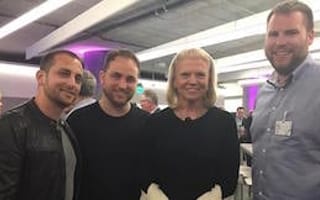
As influencer marketing becomes more nuanced, brands are having a hard time understanding how their ambassadors are reaching their target audience.
One former influencer hopes to change that.
Beverly Hills-based Influential developed a platform which uses data to connect brands with their ideal influencers, helping companies manage the process like a traditional media buy, something businesses have wanted for some time.
“Essentially, we allow a brand or agency to identify, collaborate, deploy and optimize in real time and provide full validation at the end of the campaign,” said CEO Ryan Detert. “We're doing a media buy on social by matching media brands with influencers that can deliver the message at scale."
Originally called The Influential Network, Influential was founded for a very different reason. Back in the early days of social media, Detert created a number of niche social media accounts, boasting millions of followers at its peak on accounts like @Travel, @Automotive and @Fashion. Over time he was able to monetize the accounts by featuring relevant brands, effectively practicing influencer marketing before the term was ever coined.
“I am not famous, I have no talent, but at my height, I had more than 30 million followers on Twitter and Instagram,” said Detert. “Over time, I realized that in order to actually create scale and deliver a six and seven-figure campaign, the same way you would do a digital media buy, we had to create a checklist.”
So the company pivoted, eventually developing an app which allowed communication between brands and influencers before adding an enterprise dashboard specifically for brands and agencies. On the dashboard, brands are presented with a number of social media influencers capable of interacting with a specified demographic. They interact with the influencers via the mobile app, eliminating the middleman and allowing brands and influencers to collaborate throughout the content creation process.
"Up until recently, people would look at an influencer and only see the number of followers," said Detert. "There was nothing about engagement or demographics, so education has been a big part of the process for us."
The pivot came at precisely the right time. As a number of social media personalities started racking up influence in the form of millions of followers, brands saw an opportunity to use their influence to reach an engaged audience. For brands, the problem was managing expectations. Traditional marketing practices don’t exactly work on the internet. According to Detert, there are three types of influencers: traditional celebrities, internet celebrities and niche accounts. Brands love traditional celebrities because they see 10 million Twitter followers, but Detert said these celebrities are often the worst choice a brand can make.
“Celebrities have a massive following, but don't get a lot of people like or retweeting compared to their overall size,” said Detert. “The web celebrities are born and bred on a specific platform, and they became famous by creating content that is relevant, and they have the highest levels of engagement. If a brand is adamant about having a forward facing person, a Sophia Vergara or a Kevin Hart, we recommend they surround them with web celebrities with high engagement capable of reaching the specific demographic.”
As the market became more refined, Influential’s platform began to take shape. Two years ago Detert started seeing a huge jump in demand.
“I remember a few years ago trying to figure out a way to take these millions of followers and convert them to dollars, and all of a sudden, it all changed,” said Detert. “Around two years ago, all the budgets opened up and we started seeing RFP's include 10-20 percent for something involving influencer marketing across multiple social platforms. The growth has been exponential."
In July, the company closed a $5 million Series A round of funding, and the company currently has 40 employees in its Beverly Hills headquarters, with additional offices in Las Vegas and New York City. As the team considers a Series B, the scale of the company’s development from monetizing vertical social media accounts to developing an all-in-one marketing matchmaker isn’t lost upon Detert.
“If you told me three years ago what this company looks like today, I would have told you you're crazy,” said Detert. “But the way the company was created is completely organic, and that’s something I’m really proud of.”
Images via Facebook
Have a news tip for us or know of a company that deserves coverage? Let us know or tweet us @builtinla.



